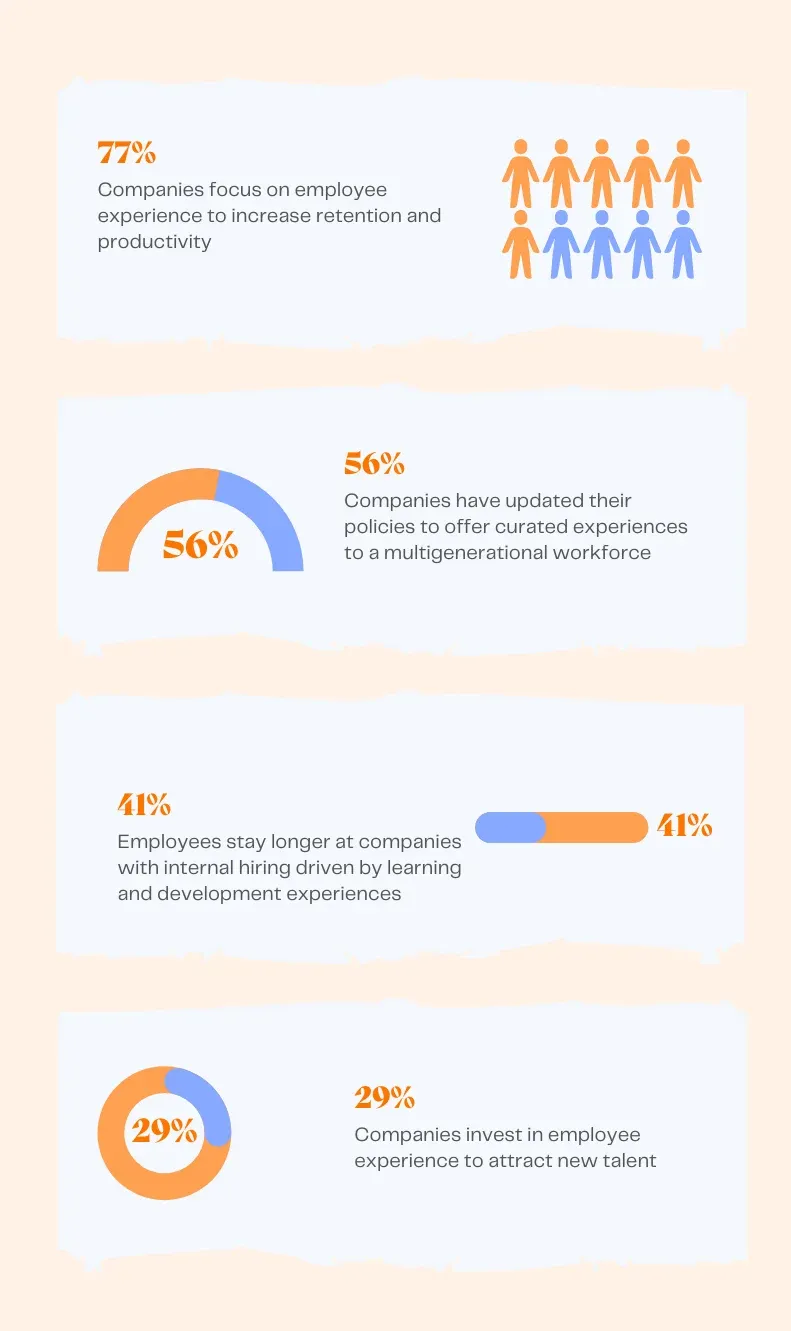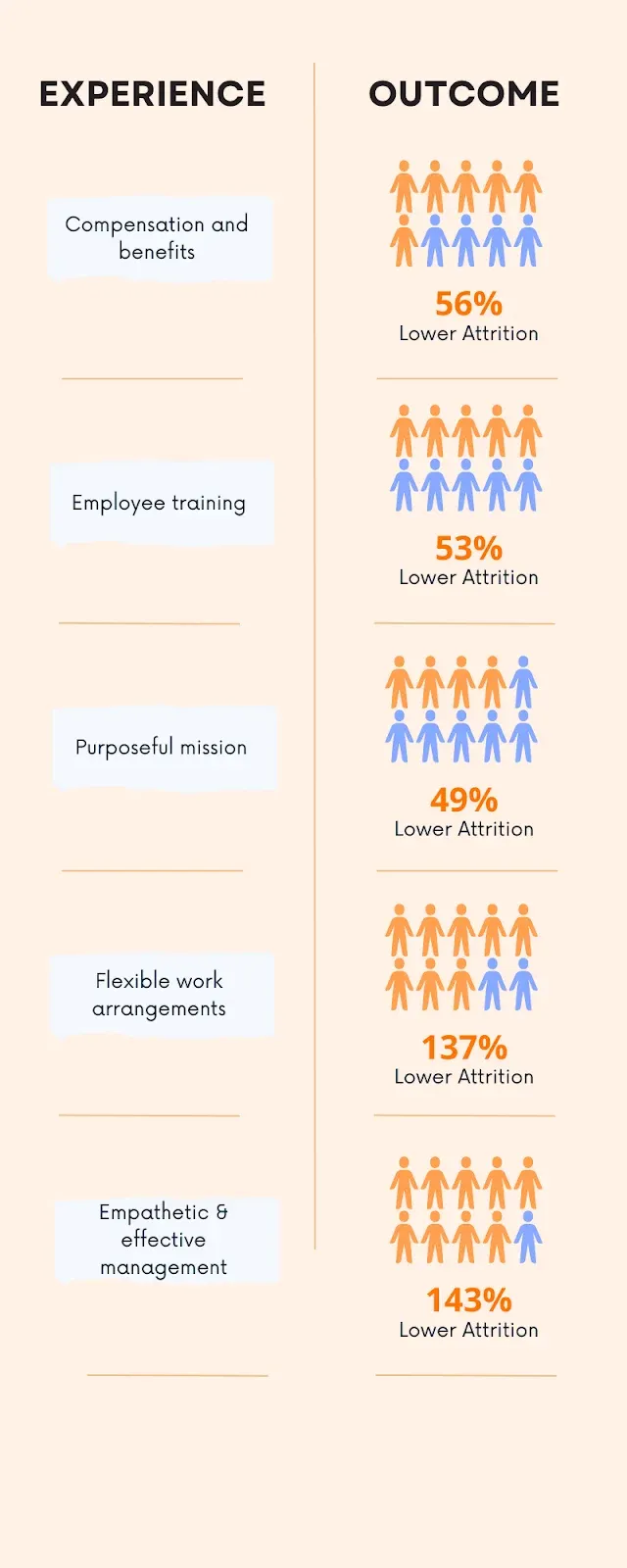Why is Employee Experience Important and What are its Outcomes
Employee experience isn't just a buzzword or marketing term. It's the key to your success. Here are 10 reasons why employee experience is important.
On this page
- Employee experience is a business imperative
- The employee experience shouldn’t be like buying car insurance
- Why is employee experience important
- How to prioritize employee experience
- Outcomes of positive employee experience
- Leveraging Empuls to elevate employee experience for a thriving workplace
- Towards an employee-centric future
In recent years, we have seen many companies invest heavily in one of their most vital assets—their employees. From free lunches to Fun Fridays, relaxed workspaces, standing desks, or yoga/meditation rooms, there’s been a slew of initiatives aimed at enthusing employees and accelerating productivity. However, why is employee experience important beyond just perks?
But here’s the catch: most of these companies focus on perks and benefits. Only a handful of organizations prioritize the employee experience to create a stronger and more meaningful relationship with their workforce. This is not for the lack of trying, though.
The 2020 HR Sentiment Survey proves that employee experience is currently ranking as one of the top initiatives for business leaders (50% responders).
The problem lies in comprehending the importance of the employee experience and accurately mapping it to positive business outcomes. In most cases, employers are employees who are misaligned on what drives good experiences.
Employee experience is a business imperative
The shift in power from organizations to individuals has led to more and more businesses focusing on improving the journey their employees take with them – a journey called the employee experience.
As the new KPI for measuring retention, productivity, and overall performance, the employee experience drives business growth and new customer acquisition. You cannot underestimate its worth!

Let’s make it a little more relatable by using the analogy of buying car insurance.
The employee experience shouldn’t be like buying car insurance
Let’s ask you a simple question—what is the similarity between employee experience and buying car insurance?
Buying a new car comes with the added responsibility of purchasing good car insurance. However, the process of buying one can leave you stressed and overwhelmed.
Somewhere between resisting overenthusiastic sales pitches, comparing hundreds of policies, finding the one with the right price (which doesn’t burn a hole in your pocket), reading the fine print (don’t skip it!), and completing endless paperwork, the buyer is left drained from the insurance buying experience and has little enthusiasm left to enjoy his/her newly insured car.
Similarly, an unsupportive work environment, challenging technologies, mounting work pressure, and strained relationships at the office can leave your employees feeling drained and disinterested in their work.
To counter this, you must provide your employees with the experience that makes them emotionally committed to their work and feel valued. Treat them with empathy, and they will be your company’s strongest brand advocates.
Forbes recommends a combination of physical (workplace), social (relationships), and technological (tools and processes) elements to create a positive employee experience. It involves multiple stakeholders aligned toward creating a holistic workplace centred around the employees as a business initiative.

Why is employee experience important
Simply put, employee experience is all about putting people first. Employees are the backbone of a business, and their actions can dictate the rise or fall of an organization.
The kind of relationship they have with employers, the amount of effort they will dedicate to growing the business, and the service they will provide to the customers are dictated by how the company prioritizes employee needs (if at all).
1. Talent attraction and retention
A positive work environment attracts top talent and keeps employees engaged, reducing turnover rates. Job seekers evaluate companies based on culture, growth opportunities, and overall experience.
When employees feel valued and supported, they are more likely to stay, lowering recruitment and training costs. The importance of employee experience in retaining skilled professionals cannot be overlooked.
2. Revenue growth and shareholder returns
A well-designed EX strategy drives business success by improving productivity, enhancing customer interactions, and reducing operational inefficiencies.
Engaged employees are more motivated to contribute, leading to higher revenue and improved shareholder value. Businesses that invest in EX often see a direct impact on profitability and long-term sustainability.
3. Cohesion and collaboration
A workplace built on trust and support fosters stronger teamwork. When employees feel heard and appreciated, they collaborate more effectively, breaking down silos and driving better results. Creating an environment that encourages open communication and teamwork strengthens both employee relationships and overall business efficiency.
4. Enablement and empowerment
Giving employees access to the right tools, resources, and training enables them to perform at their best. When employees feel empowered to take initiative and make decisions, they are more confident and engaged in their roles. Organizations that prioritize EX create a culture of trust and ownership, leading to higher performance and job satisfaction.
5. Engagement and work commitment
Disengaged employees are costly—they lead to higher absenteeism, reduced productivity, and a negative work culture. The importance of employee experience lies in its ability to foster commitment and motivation.
When employees feel connected to their work, their engagement levels rise, resulting in better performance and a stronger alignment with company goals. Organizations that prioritize EX see greater job loyalty and increased discretionary effort from their workforce.
6. Creativity and Innovation
Innovation thrives in an environment where employees feel secure, encouraged, and inspired. A workplace that prioritizes well-being and professional development allows employees to think creatively and explore new ideas.
When employees feel supported, they take calculated risks, experiment, and contribute innovative solutions that drive business growth.
7. Brand advocacy
Satisfied employees naturally become ambassadors for the company, sharing their positive experiences with potential hires, customers, and industry peers. A strong EX enhances employer branding, improves reputation, and helps attract high-quality talent. Employees who believe in the company’s mission and values create a ripple effect that strengthens external brand perception.
The importance of employee experience extends beyond HR—it influences company culture, profitability, and overall growth. Prioritising EX results in a more engaged workforce, improved collaboration, and a stronger business foundation. Why employee experience matters is clear: when employees thrive, businesses flourish.
How to prioritize employee experience
While the most common benefits of investing in the employee experience include customer satisfaction and productivity, there are several other reasons why it is essential and how to prioritize it.
Here's a simple thumb rule to go by—if your employees show up to work and leave in a good mood, if they are dedicated to their work and customers if there's minimal friction within and across teams—then you're on the right path to a transformative employee experience strategy.
Outcomes of positive employee experience
A recent LinkedIn report showed the business impact of good employee experience strategies:

Multiple studies conducted by Forbes, Gartner, and Gallup show that while some organizations are still catching up to the trend of appreciating and motivating their employees, others, realizing the value of high-ROI employee experience, are steadily making it to the top of the Best Employer lists, reaping rich rewards.
Leveraging Empuls to elevate employee experience for a thriving workplace

A great employee experience boosts engagement, productivity, and retention. Employees who feel valued and connected are more committed to their work, leading to stronger morale and lower turnover.
This is where Empuls makes a difference. By integrating recognition, rewards, feedback, and collaboration, Empuls helps businesses create a culture where employees thrive.
✅ Meaningful recognition: Celebrate achievements with personalized rewards and peer appreciation.
✅ Real-time employee feedback: Gather insights through surveys to address concerns proactively.
✅ Stronger team connections: Foster engagement with a social intranet for seamless communication.
✅ Personalized incentives: Offer wellness perks, tax-free benefits, and exclusive discounts.
✅ Automated engagement: Keep employees motivated with structured recognition programs.
Employee experience drives success. With Empuls, organizations can build a workplace where employees feel valued, supported, and inspired.
Create a workplace where employees feel valued, engaged, and motivated. Empuls helps you drive recognition, rewards, and meaningful connections—all in one platform.
Towards an employee-centric future
To operate in the modern, competitive business environment based on brand equity, sustainable growth, talent retention, and productivity, companies must cultivate a deeper understanding of their employees while continually enhancing their experience based on regular feedback.
The path forward lies in building an integrated experience framework where employees are treated with empathy, valued, nurtured, and instilled with a sense of purpose while working in an inclusive and sustainable environment.
“EX isn’t just fun events. It’s making people feel safe and happy so they can perform their best.” — Wassim Eid, CHRO, Chalhoub


















